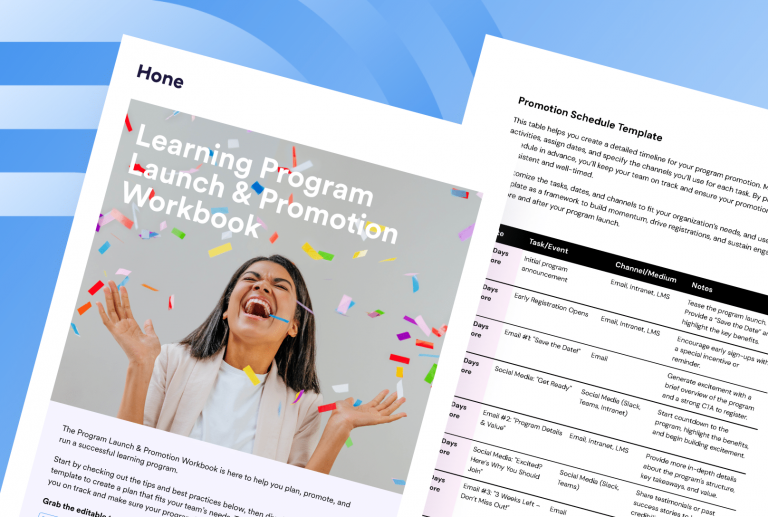What are Power Skills?
The definition of power skills in the learning and development space refers to a set of transferable and in-demand competencies that can help individuals be successful in a rapidly changing work environment. These skills are often referred to as “soft skills” or “21st-century skills” and include:
- Communication: The ability to effectively convey information and ideas through written, oral, and visual means.
- Critical thinking: The ability to analyze information and situations to make informed decisions.
- Collaboration: The ability to work effectively with others towards a common goal.
- Creativity: The ability to generate new ideas and approaches to problem-solving.
- Adaptability: The ability to adjust quickly to changing circumstances and environments.
- Leadership: The ability to influence and motivate others towards a shared vision.
- Digital literacy: The ability to effectively use technology and digital tools for communication, collaboration, and problem-solving.
These power skills are becoming increasingly important in the modern workplace as technology continues to change the nature of work. Forbes declared power skills essential to the future of work. More job activities are automated, but machines and computers cannot replicate soft skills. As a result, employers seek individuals who can bring diverse skills and perspectives to their organizations.
What is the link between soft skills and emotional intelligence?
Power skills refer to emotional intelligence (EI). EI is the ability to understand, use, and manage emotions. High EI enables individuals to communicate, overcome challenges, relieve stress, and manage conflict. Training employees to have a higher EI improves the company’s bottom line. Strong communicators have enhanced sales approaches. And businesses can improve customer service with guidelines on solving pain points.
- Self-management, or the ability to take responsibility for one’s behavior and well-being
- Self-awareness, or the ability to understand one’s actions, emotions, and thoughts
- Social awareness, or the ability to consider others’ perspectives
Relationship management uses the three EI parts to maintain interactions with others successfully.
How Can Companies Leverage Power Skills in the Workplace?
Human-centered skills help individuals flourish in the workforce. In addition, employees with these skills benefit the company’s success.
For instance, clear communication translates to practical problem-solving. Communication is critical to successful teamwork, especially with remote or hybrid workers. Traditionally, soft skills have been secondary to hard skills. Hard skills are technical abilities, such as typing for a court reporter. But power skills have become more valuable since the pandemic affected the workplace.
Companies can leverage the power skills of their employees better by implementing the following strategies:
- Skills assessment: Conduct regular evaluations of employees’ power skills to identify strengths and areas for improvement.
- Training and development: Provide training and development opportunities that help employees build and refine their power skills, such as workshops, coaching, mentoring, and on-the-job experiences.
- Cross-functional collaboration: Encourage cross-functional collaboration among employees to promote knowledge sharing, diversity of thought, and the development of skills such as communication, collaboration, and leadership.
- Flexible work arrangements: Offer flexible work arrangements, such as remote work and flexible schedules, to help employees balance their personal and professional lives and build their adaptability skills.
- Performance evaluations: Use performance evaluations to regularly assess the impact of employees’ power skills on their work and the organization and to provide feedback and support for improvement.
- Technology integration: Integrate technology into work processes and encourage employees to use technology to enhance their skills and productivity.
By leveraging the power skills of employees, companies can create a more dynamic and adaptable workforce that can respond to changing market conditions and customer needs, drive innovation, and achieve long-term success.
What is Power Skills Training?
While soft skills may seem to be an innate part of the personality, employees can learn them. Power skill training strengthens teams and leads to higher retention rates. In addition, a workplace culture of empathy and vulnerability builds a sense of belonging.
The following are some power-skill training methods:
- Cohort-based classrooms – Expert-led lecture-style training with visual components and group activities at scale
- eLearning – Interactive online courses for individuals to complete in their time (self-paced)
- Coaching – Pairing a coach or manager with a student or employee
An MIT Sloan study found that soft-skill training had a 250 percent return on investment after eight months. Power skills boost productivity and the ability to complete complex tasks faster.
The study also found that training had a “spillover” effect. For example, other employees showed workplace improvements by working with training participants.
5 Power Skills and Training Examples
Dozens of power skills fall into five main categories. Soft skills are beneficial, and some are exceptionally valuable for management. Communication and teamwork skills help keep teams running smoothly. Likewise, employees need time-management skills to ensure projects meet deadlines. Employees with problem-solving and critical-thinking skills can make informed and reasoned decisions. These proficiencies and leadership skills are essential for managers and leaders. For instance, management must know how to resolve conflicts should an issue arise.
1. Communication Skills
Communication skills involve listening, speaking, and observing. These skills enable workers to give and receive different types of information: communicate ideas, share status updates, and discuss daily activities.
- Active/Empathic listening is concentration on what is being said. It involves giving one’s full attention to the speaker. And the speaker must recognize the listener’s full attention.
- Confidence is the tendency to rely on oneself. It helps employees make decisions and control their emotions.
- Conflict management/resolution helps employees handle disputes and discords in the workplace. These skills can also fall into the teamwork category.
- Friendliness is the ability to be sociable. Individuals are more willing to receive information from those they consider friendly.
- Negotiation is a back-and-forth discussion to reach an agreement on conflicting issues. Strong negotiators achieve their ideal outcome. And they add a sense of power to the bargaining table.
- Public speaking is the talent of addressing an audience. Good public speakers can enhance their (and their company’s) reputation.
Employees must use various communication strategies, including face-to-face conversation, videoconferencing, and documentation.
2. Teamwork Skills
Teamwork is working collaboratively with a group of people to achieve a common goal. Employees need teamwork (or social) skills to work harmoniously and handle disagreements.
- Collaboration is the act of working with someone else on a task. Workers who collaborate well can bring out the best in others and the team.
- Empathy is the capability to understand what other people feel. It is seeing something from their point of view and imagining oneself in their place.
- Interpersonal skills are competencies to read others’ behaviors or signals. Employees with interpersonal skills can connect and influence others.
- Rapport-building is how individuals connect, establish communication, and share feelings. This skill nurtures professional relationships.
- Respectfulness is a practice of courtesy and politeness. Respectful individuals seem more trustworthy and cultivate a perception of status and power.
Even employees who complete projects alone need these skills. Teamwork is a social skill that improves career paths.
3. Time Management Skills
Time management skills ensure that employees perform their jobs efficiently and productively. Employers want to trust employees to work and finish tasks even if they’re not with them.
- Being ambitious is having high aspirations to succeed. These employees have the drive to complete tasks timely and well.
- Detail-oriented is the behavior of paying close attention to small details. Detail-oriented individuals deliver accurate and high-quality work.
- Diligence shows care in one’s activities, such as a high work ethic. This trait makes a favorable impression and is the key to success.
- Prioritization is the arrangement of things by urgency or importance. Workers who can rank tasks increase effectiveness. They are also less likely to become discouraged by change.
- Motivation is enthusiasm. Motivated workers excel at finishing tasks. They can rally others around them to be more productive.
- Work ethic is an intrinsic principle that hard work is a reward or a moral good. A strong work ethic translates to higher performance levels.
Time-management skills are essential for any role. But they are instrumental in hybrid and remote work environments.
4. Problem-Solving & Critical-Thinking Skills
Problem-solving and critical-thinking skills help employees identify and address a problem. In addition, these skills aid individuals in making sense of information.
- Analysis/Analytical thinking is the ability to conclude from deconstructed information. Analytical thinkers can transform data into an actionable plan.
- Creativity is the tendency to generate ideas. Therefore, creative individuals are ideal for creative roles. But they can also make data connections more easily.
- Innovative is the ability to introduce new and creative ideas. Innovative workers can boost productivity by breaking the dangers of monotony.
- Investigative is an intensity to examine something systematically. Investigative individuals can uncover missed problems and solutions.
- Questioning results in finding out more information to develop an answer or insight. Instinctively curious workers foster other power skills and positively challenge standard practices.
These skills help workers challenge preconceived notions to create the best path forward.
5. Leadership Skills
A good leader motivates their team to work together for the best results. Therefore, leadership skills are essential to keep projects on track and the workplace harmonious.
- Adaptability is the ability to adjust to change. Therefore, leaders must be flexible since change is constant and inevitable.
- Decision-making is the act of assessing information and making thoughtful choices. Strong leaders rely on experience, data, and critical-thinking skills to make timely decisions.
- Delegation is the process of assigning responsibilities to others. Leaders ensure that the selected person has the needed resources for a challenge.
- Intercultural fluency is the demonstration of respecting and valuing other cultures. Open, sensitive, and inclusive leaders maximize their team’s potential and abilities.
- Reliability is the quality of being trustworthy and dependable. As a result, workers are more inclined to follow and listen to a reliable leader.
- Team-building is the action of getting people to work together effectively. It is a vital responsibility of a manager to keep groups functioning.
Leaders plan, communicate and initiate action. But they can also be role models, inspire, and build morale in their departments.











